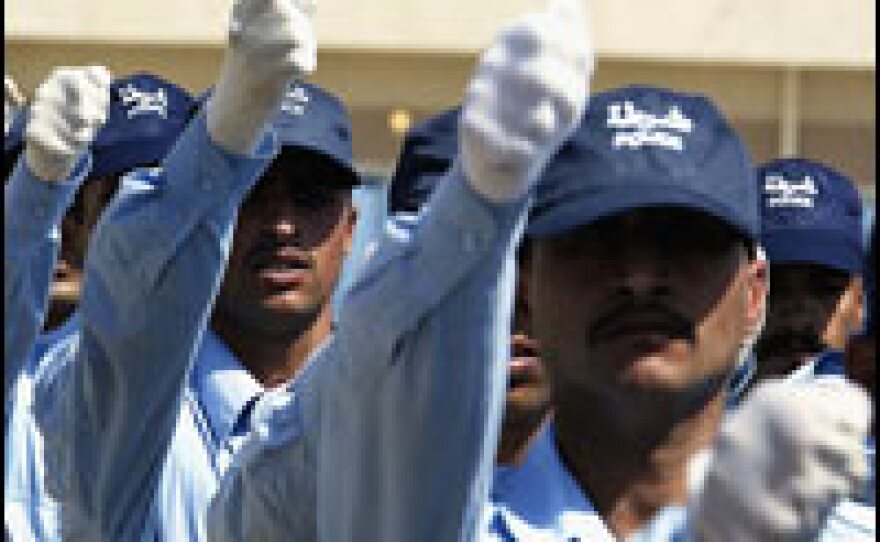Iraq's most important moneymaker -- its oil industry -- lost $16 billion in potential foreign sales to insurgent attacks, criminals and bad equipment, a U.S. audit says. A second report says that a new building used to train police in Baghdad was poorly constructed.
Melissa Block talks with Stuart W. Bowen, special inspector general for Iraq reconstruction, about the two reports. Bowen released both reports as he prepared to testify before the House Government Reform Committee, which has been looking into waste and fraud in billions of dollars worth of Iraq reconstruction projects.
"Let me simply say that the infrastructure security issue is an enormous one..." Bowen says in the NPR interview. "It underscores the need to protect those critical nodes in Iraq to ensure that their economy will continue to grow."
An unclassified summary of the classified audit on Iraq's energy sector says the Baghdad government "must take bold action" to protect its oil and electrical facilities.
"Iraq cannot prosper without uninterrupted export of oil and the reliable delivery of electricity," Bowen says in the summary released Thursday.
The other report says that the construction of the largest police academy in Iraq is so bad, with sewage leaking through the buildings, that the buildings pose both structural and health risks.
"It was a disaster," Bowen says. He says that the dean of the college had to close the facility for two weeks and was concerned that many of the recruits wouldn't return.
In addition to the estimated $16 billion loss of potential oil export revenue between January 2004 and March 2006, Bowen said Iraq also is paying billions of dollars to import the refined petroleum products it needs.
The United States has invested about $320.3 million to help Iraq's security forces better protect the oil and electricity infrastructure. And it has developed an array of plans to help the three Iraq ministries that share responsibility -- the Ministry of Defense, Ministry of Oil and Ministry of Electricity.
But Baghdad didn't have a permanent government in place until recently, and some ministries showed "limited initiative," leaving Iraq with "much to do" to put the U.S. plans into action, the summary said.
Bowen said that even if attacks ceased, criminal activity and aging and poorly maintained infrastructure would still hamper oil exports and electricity production.
The full energy report remains classified, as do U.S. figures on the number of attacks to the sector. Though the unclassified summary was released Thursday, the classified report was completed in July.
The Bush administration predicted three years ago that Iraq would finance its own reconstruction using oil revenues. Iraq, a founding member of the Organization of Petroleum Exporting Countries, has the world's third-highest proven reserves.
But oil production slipped after the invasion, and the country has struggled to resume production to prewar levels of about 2.5 million to 3 million barrels a day. As of last May, production stood at about 1.9 million barrels a day, according to the U.S. Energy Information Administration.
It is estimated that in 2005, oil exports earned the country about $26 billion.
Material from the Associated Press was used in this report.
Copyright 2022 NPR. To see more, visit https://www.npr.org. 9(MDAzMjM2NDYzMDEyMzc1Njk5NjAxNzY3OQ001))






